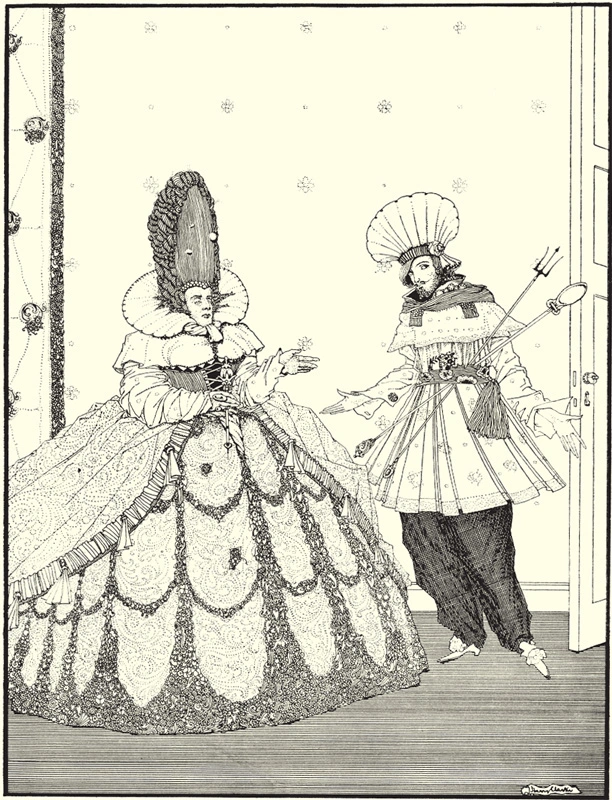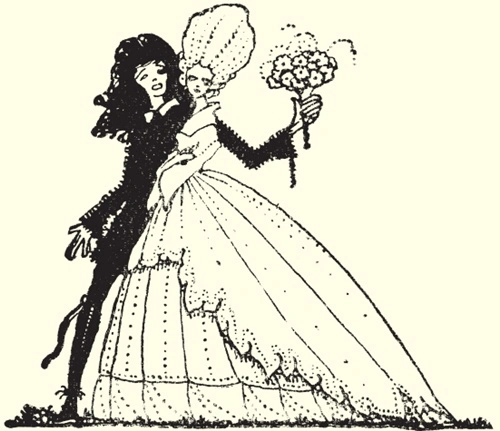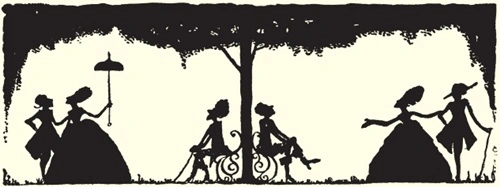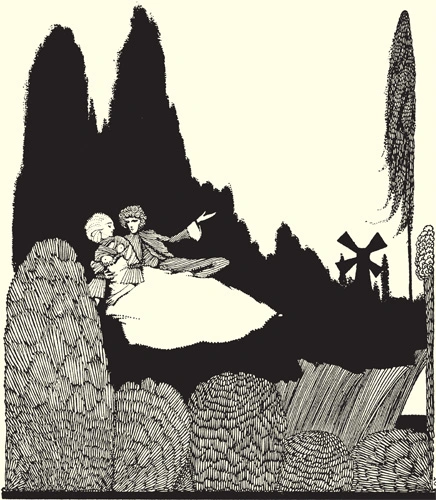At this, he began to weep, the knife fell out of his hand and he went out to the yard, where he killed a
little lamb and dressed it with such a good sauce that the queen assured him that she had never eaten anything so good in her life. At the same time, he had taken little Aurora to his wife, to hide
her in his quarters in the courtyard.
About eight days later, the wicked queen said to the chef, “I will eat little Day.”
The chef said nothing, having decided to deceive her, as he had done before. He went to find little Day, and found him with a big sword in his hand, with which he was fencing with a large monkey
– the child was then only three years of age. He took him in his arms and brought him to his wife to hide with his sister, and, in little Day’s room, cooked a very tender young kid,
which the ogress found to be wonderfully good.
This was all very well, but one evening the wicked queen said to the chef, “I will eat the young queen with the same sauce I had with her children.”
At this point the poor chef despaired of being able to deceive her again. The young queen had turned 20, not taking into account the 100 years she had been asleep, and her skin was a bit tough,
although very fair and white. The chef resolved to cut her throat, in order to save his own life, and went up into her chamber, intending to do it at once. He prepared himself as well as he
possibly could and came into the young queen’s room with his dagger in his hand. He had decided not to take her by surprise, but told her very respectfully of the orders he had received from
the queen mother.

“Do it, do it,” she said, stretching out her neck, “carry out your orders, and then I shall go and see my poor children, whom I so dearly loved,” for ever since they had
been taken away without her knowledge she had believed them to be dead.
“No, no, Madam,” cried the poor chef, in tears. “You will not die, and you will see your children again, but it must be in my living quarters, where I have hidden them, and I
shall deceive the queen once again by giving her a young hind instead of you.”
He then brought her to his lodgings and, leaving her to embrace and cry with her children, he dressed a young deer, which the queen had for her supper, and devoured it with as much appetite as
if it had been the young queen. She was exceedingly pleased with her cruelty, and had invented a story to tell the king when he returned, about how ravenous wolves had eaten up the young queen and
their two children.
One evening, when the queen was, as usual, rambling around the palace precincts to see if she could smell any fresh meat, she heard little Day crying, because his mother was going to punish him
for being naughty. At the same time, she heard little Aurora interceding for her brother.
The ogress immediately recognised the voice of the young queen and her children, and, quite maddened by having been deceived, she commanded (in a most horrible voice, which made everybody
tremble) that next morning, by break of day, a large tub should be brought to the middle of the great court, and that this should be filled with toads, vipers, snakes and all sorts of serpents, and
that the young queen and her children, the chef, his wife and maid should be brought there with their hands tied behind their backs.
And so they were brought out, and the executioners were just about to throw them into the tub when the king (who was not expected to return so soon), entered the courtyard on horseback and
asked, with the greatest astonishment, what was the meaning of that horrible spectacle? No one dared tell him, but the ogress, enraged to see what had happened, threw herself head first into the
tub, and was immediately devoured by the ugly creatures she had ordered to be thrown into it. The king was very sorry, for she was his mother, but he soon comforted himself with his beautiful wife
and his pretty children.

THE MORAL
To get as prize a husband rich and gay,
Of humour sweet, with many years to stay,
Is natural enough, ’tis true;
To wait for him a hundred years,
And all that while asleep, appears
A thing entirely new.
Now at this time of day,
Not one of all the sex we see
Doth sleep with such profound tranquillity:
But yet this Fable seems to let us know
That very often Hymen’s blisses sweet,
Altho’ some tedious obstacles they meet,
Are not less happy for approaching slow.
’Tis nature’s way that ladies fair
Should yearn conjugal joys to share;
And so I’ve not the heart to preach
A moral that’s beyond their reach.


PUSS IN BOOTS
There once was a miller with three sons. When he died he left them his mill, his ass and his cat, which was all he possessed. The division of the
assets was soon made, without the help of a lawyer, who would soon have eaten up the entire poor bequest. The eldest son had the mill, the middle son had the ass, and the youngest had nothing but
the cat.
The poor young fellow was quite despondent at having received so little.
“My brothers,” he said, “may make a good enough living by joining their inheritance together, but once I have eaten my cat and made a muff for myself of his skin, I will die
with hunger.”
The cat, who had heard all this, but pretended that he had not, said to him with a grave and serious air, “Do not worry yourself, my good master. You need only give me a bag and have a
pair of boots made for me, so that I may make my way through the dirt and the brambles, and you will see that your inheritance is not so bad as you imagine.”
Though the cat’s master did not put too much store on what he said, he had, however, often seen the cat play many cunning tricks to catch rats and mice – hanging by his heels, or
hiding himself in the flour, or pretending to be dead – so he did not altogether despair of his being able to help him in his miserable situation.
When the cat had what he had asked for, he put on his boots, put his bag around his neck and, holding the strings of the bag in his two front paws, went into a warren that had a large population
of rabbits. He put some bran and dandelions into the bag, stretched himself out to his full length as if he were dead, and waited for some young rabbit, not yet wise to the ways of the world, to
come and rummage in his bag for what he had put into it.
He had just lain down when he got what he wanted – a rash and foolish young rabbit jumped into his bag, and Mr Puss, immediately pulling the strings of the bag to close it, killed him
without pity. Proud of his prey, he brought it to the palace and asked to speak with the king. He was shown upstairs to the king’s apartment and, bowing low, said, “Sire, I have brought
you a rabbit, which my noble lord, the Marquis of Carabas” (for this was the title that Puss liked to give his master), “has commanded me to present to Your Majesty from him.”
“Tell your master,” said the king, “that I thank him and that I am very pleased.”
Another time the cat went and hid himself among some standing corn, holding his bag open. When a brace of partridges ran into the bag, he pulled the strings and caught them both. He went and
made a present of them to the king, as he had done with the rabbit. As before, the king was very pleased to receive the partridges, and he ordered that the cat be given some drinking money.
The cat continued in this way for two or three months, from time to time presenting to the king game taken by his master. One day, when he knew for certain that the king would be taking the air
beside the river with his daughter, the most beautiful princess in the world, he said to his master, “If you follow my advice, your fortune will be made. You have nothing to do but go and
bathe yourself in the river where I show you, and leave the rest to me.”
The Marquis of Carabas did what the cat advised, without knowing why.
While he was bathing the king passed by, and the cat began to call out, as loudly as he could,
“Help, help, my lord, the Marquis of Carabas is drowning!”
When he heard the commotion the king stuck his head out of the window of his coach, and seeing that it was the cat who had so often brought him such good game, he ordered his guards to run
immediately to the assistance of his lordship.
While they were pulling the poor marquis out of the river, the cat came up to the coach and told the king that while his master was bathing some rogues came along. They stole his clothes, even
though he had called out, “Thieves, thieves!” several times, as loudly as he could. The cunning cat had hidden the clothes under a stone. The king immediately ordered the officers of
his wardrobe to run and fetch one of his best suits for the lord Marquis of Carabas.
The king received the marquis with great kindness and, as the fine clothes he had given him set off his good looks (for he was well built and very handsome), the king’s daughter secretly
took a fancy to him. The Marquis of Carabas had no sooner cast two or three respectful and somewhat tender glances in her direction, than she fell in love with him to distraction. The king invited
the marquis to drive out with them in the coach to take the air with them. The cat, overjoyed to see his project beginning to succeed, marched on ahead and met with some farm workers, who were
mowing a meadow.
He said to them, “Good people, you who are mowing, if you do not tell the king that the meadow you are mowing belongs to my lord, the Marquis of Carabas, you will all be chopped into
mincemeat.”
When the king asked the mowers to whom the meadow belonged they all answered together, “To my lord, the Marquis of Carabas,” for the cat’s threats had made them terribly
afraid.
“Truly a fine estate,” said the king to the Marquis of Carabas.
“As you can see, sir,” said the marquis, “this is a good meadow that never fails to yield an excellent harvest every year.”
The cat, who was still going on ahead, met with some reapers.
1 comment